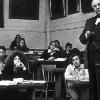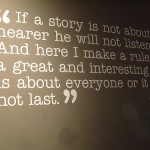 As we officially open the school year, I have been thinking a lot about what are the secrets to success in law school. I understand that Dean Rofes spoke at Orientation about the sausage races at Miller Park. (I personally always root for the Chorizo Sausage!) Law school may sometimes feel a bit like a race, or, to think more classically about Aesop’s fables, like the story of the Tortoise and the Hare. In that story, the tortoise ultimately wins the race using slow and steady steps to the finish line.
As we officially open the school year, I have been thinking a lot about what are the secrets to success in law school. I understand that Dean Rofes spoke at Orientation about the sausage races at Miller Park. (I personally always root for the Chorizo Sausage!) Law school may sometimes feel a bit like a race, or, to think more classically about Aesop’s fables, like the story of the Tortoise and the Hare. In that story, the tortoise ultimately wins the race using slow and steady steps to the finish line.
What does slow and steady have to do with law school? Be steady by being methodical. Read and brief cases before every class. Be steady by outlining every night when you get home from class. An hour of outlining nightly will save you from the panic of trying to cram material at the end of the semester. Outlining each day also helps you to see where you have questions, so you can ask your professors or study group members to help you unravel those questions. One of the benefits of a Marquette education is that the faculty are accessible; use that accessibility to your advantage.
Be also like the tortoise by being slow. The study of law takes time. It takes time to ponder why a decision was rendered or to think about whether a court’s reasoning is sound. One of the ASP leaders in my Orientation section said that it takes at least ten minutes to read each page in a casebook. Good legal reading, like good legal writing, is slow going.
What tips do others reading this blog have for success in law school? Share your strategies for success here!
Best wishes for a wonderful school year!
 Last year, the Legal Writing Institute (LWI) Board of Directors created a Monograph series. The Monograph’s first electronic volume is now available on the LWI website. The focus of this first volume is “The Art of Critiquing Written Work.” Our own Professor Alison Julien worked on this project. Professor Jane Kent Gionfriddo stated in a post to the LWI listserv that the volumes “will focus on a specific topic relevant to teaching, curriculum, scholarship or status of Legal Writing professionals and will include substantial, well-developed pieces of scholarship in the form of law review articles or book chapters that have been previously published elsewhere.”
Last year, the Legal Writing Institute (LWI) Board of Directors created a Monograph series. The Monograph’s first electronic volume is now available on the LWI website. The focus of this first volume is “The Art of Critiquing Written Work.” Our own Professor Alison Julien worked on this project. Professor Jane Kent Gionfriddo stated in a post to the LWI listserv that the volumes “will focus on a specific topic relevant to teaching, curriculum, scholarship or status of Legal Writing professionals and will include substantial, well-developed pieces of scholarship in the form of law review articles or book chapters that have been previously published elsewhere.”

 As we officially open the school year, I have been thinking a lot about what are the secrets to success in law school. I understand that Dean Rofes spoke at Orientation about the sausage races at Miller Park. (I personally always root for the Chorizo Sausage!) Law school may sometimes feel a bit like a race, or, to think more classically about Aesop’s fables, like the story of the Tortoise and the Hare. In that story, the tortoise ultimately wins the race using slow and steady steps to the finish line.
As we officially open the school year, I have been thinking a lot about what are the secrets to success in law school. I understand that Dean Rofes spoke at Orientation about the sausage races at Miller Park. (I personally always root for the Chorizo Sausage!) Law school may sometimes feel a bit like a race, or, to think more classically about Aesop’s fables, like the story of the Tortoise and the Hare. In that story, the tortoise ultimately wins the race using slow and steady steps to the finish line.